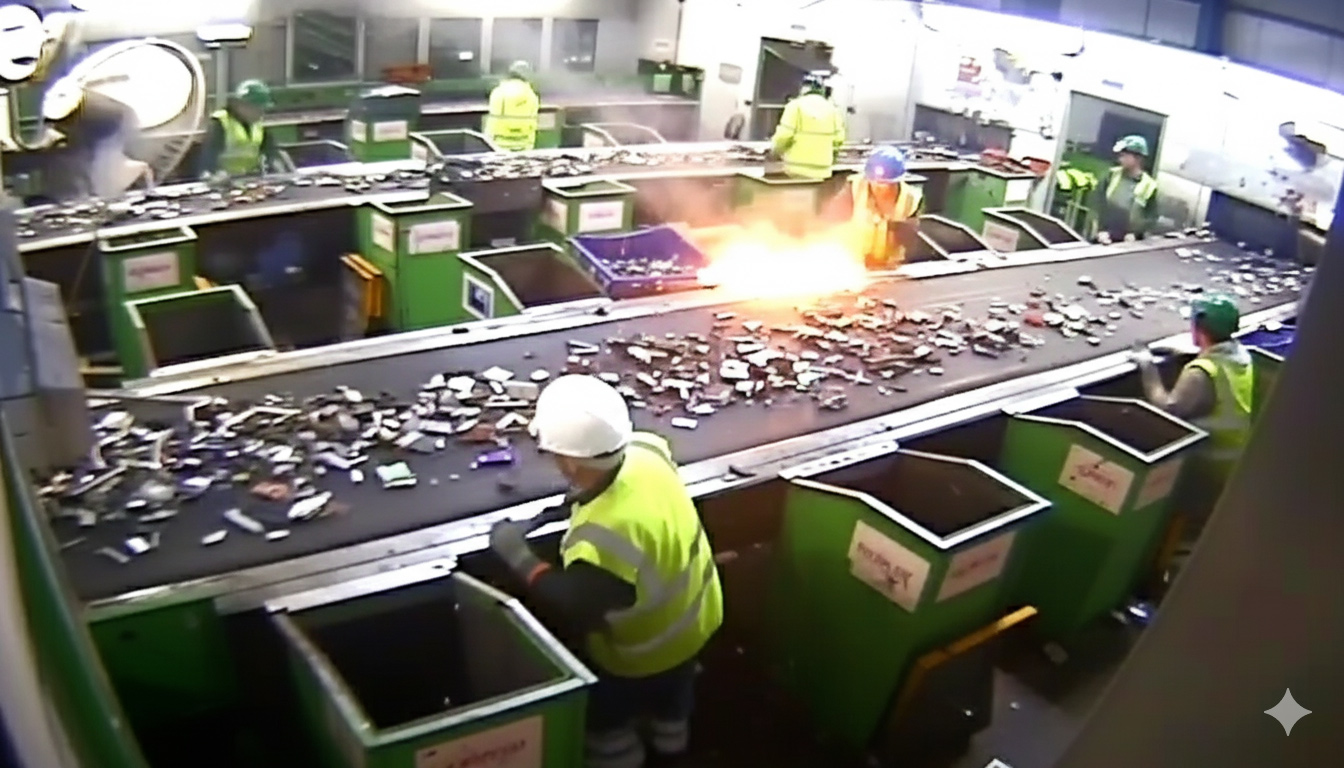Battery fires in UK waste facilities surge 71 per cent to over 1,200 incidents a year
Environment Services Association calls for universal kerbside collections to tackle growing epidemic threatening worker safety.

Research conducted for the ESA estimates these fires now cost over £1 billion annually across damage to infrastructure, business interruption, insurance premiums, and emergency service response.
The increase reflects a broader problem with battery disposal, with six billion batteries discarded across the UK each year, including 1.1 billion hidden inside electrical devices like mobile phones, electric toothbrushes, and vapes. Problematically, batteries can ignite when damaged through compaction in collection vehicles, crushing in processing machinery, or exposure to liquids during waste handling operations.
Modern lithium-ion batteries are particularly dangerous when damaged, with data-backed estimates suggesting they now cause nearly half of all waste fires in the UK. The National Fire Chiefs Council reports that these incidents threaten not only essential infrastructure but also the lives of frontline workers.
Despite industry investment of hundreds of millions of pounds in advanced fire detection and suppression systems, including AI-driven thermal monitoring and automatic shutdown mechanisms, these measures only address symptoms rather than root causes.
Collection infrastructure failures
Current collection systems for waste batteries and electrical devices are inadequate, with only 25 per cent of local councils voluntarily offering kerbside services. Most rely on bring-banks funded by compliance schemes.
Research by Material Focus found that nearly a fifth of UK consumers admit to incorrectly binning batteries, whilst separate polling revealed that the majority do not feel confident about how to safely dispose of batteries or electronic devices containing them.
This lack of convenient recycling options encourages consumers to take the easier option of binning batteries, making education efforts both challenging and inefficient.
Policy reform proposals
The ESA states that policy reform must mandate universal kerbside collections for waste batteries and small electricals across England, funded by producers under overhauled Extended Producer Responsibility regulations. The trade body argues that current voluntary approaches have failed to deliver the infrastructure needed to prevent fires at source.
Research by environmental consultancy Eunomia for the ESA demonstrates that implementing mandatory universal kerbside collections for waste batteries and small electricals could save £6 billion over the next decade by increasing recycling rates and avoiding fire-related costs.
The study suggests that retrofitting existing refuse collection vehicles with external containers to safely store batteries and small electrical items would be the most cost-effective solution. This approach could reduce waste fires from current levels to approximately 100 incidents per year, with capital expenditure equating to around 70 pence per household.
The briefing emphasises that these services, alongside increased education and engagement activity, should be funded by the producers of batteries and electrical items under overhauled producer responsibility regulations – which are long overdue. The UK Government consulted on WEEE reforms in early 2024, with 64 per cent of respondents supporting producer-funded household collections.
The ESA, alongside the National Association of Waste Disposal Officers and British Metals Recycling Association, has written to Defra minister Mary Creagh urging urgent implementation of these reforms.
"The UK is facing a growing epidemic of battery-related waste fires which threatens lives, vital infrastructure and the environment," said Michael Topham, ESA Chairman and Biffa CEO. "Whether discarded on their own or hidden inside electronic devices, batteries wreak havoc when they are thrown in the wrong bin."
The government has indicated it will continue considering proposals from the consultation, with further responses expected in 2025. These include potential enhancement of retailer obligations and the establishment of a scheme administrator to increase collection rates and promote recycling.
The proposed reforms would also address future EU regulations requiring new batteries to contain minimum percentages of recycled materials - six per cent recycled lithium and nickel, and 16 per cent recycled cobalt by 2031.
The ESA briefing warns that implementing a single kerbside collection system across England and the devolved administrations for batteries and small WEEE would enable a cost-effective, impactful, national approach to communications – which should be primarily delivered via a single body with input from relevant stakeholders.
It notes that the current voluntary approach has resulted in a somewhat piecemeal approach to delivery of communications which is both confusing for consumers and which has arguably failed to deliver the necessary level of education and engagement, according to the briefing.
Industry communications campaigns, including the ESA's "Take Charge" initiative and Material Focus's "Recycle Your Electricals" programme, continue to raise awareness about proper battery disposal. However, the ESA notes that behaviour-change and communications budgets are often among the first to be reduced by local authorities in order to protect budgets for statutory services. It is therefore essential that a "central pot" for communications exists alongside producer-funded universal kerbside services.




